 |
|
“A James Bond Festival”
In the days when James Bond
could only be seen in cinemas there were a multitude of prints of each
film in circulation of varying quality. Most 35mm prints had been
shipped around the country and became damaged through continued use. This
meant that the Bond films could look completely different depending on
where you saw them. The version of The Spy Who Loved Me shown in
Aberdeen could be faded, spliced and even have missing frames when it finally
ended up in Bristol. Film was regarded as a commodity and it was
unusual for new prints to be struck unless they were classics being
re-released theatrically, or
prestigious art films screened at the National Film Theatre. |
 |
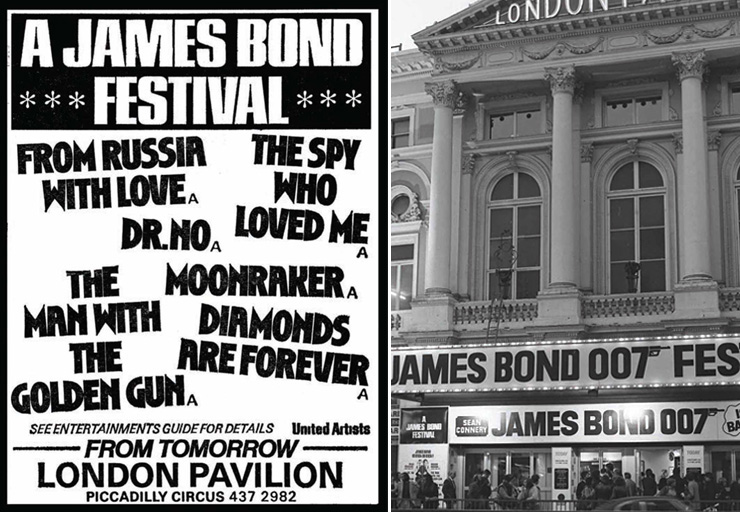 |
|
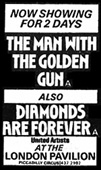 |
Six new prints were struck however, for a
season of back-to-back Connery/Moore James Bond films shown at the
London Pavilion from Thursday October 30 - Wednesday November 12, 1980. Advertised as ‘A
James Bond Festival’, no special poster was created but the
advertising hoardings outside the cinema adapted the 1965 back-to-back
artwork and stuck Roger Moore’s head on Sean Connery’s body. The six
films programmed as double-bills alternated for the two-week engagement - Dr. No was shown
with Moonraker on Sunday, Monday & Tuesday;
Diamonds Are Forever was paired with The Man With The Golden
Gun on Wednesday & Thursday, with From Russia With Love and
The Spy Who Loved Me screening on Friday & Saturday. Both
films screened twice each day, with an additional performance on
Saturdays. |
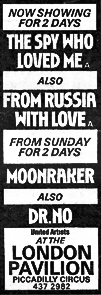 |
|
The festival was then replaced by a two-week
screening of Terror Train - a 1980 Canadian-American slasher
film which marked the directorial debut of Roger Spottiswoode, who
would later helm Tomorrow Never Dies in 1997. The James Bond
Festival resumed for another week commencing Thursday November 27,
1980, followed by six-week break when the London Pavilion screened other
United Artists distributed films including the European premiere of
Freedom Road starring boxer Muhammad Ali, and a double-bill of A Fistful of Dollars/Rollerball.
The original film in the ‘Dollars’ trilogy had been just been reclassified
‘AA’ by the BBFC. |
|
|
The James Bond Festival returned to the
London Pavilion for another two weeks from Thursday January 22, 1981. The prints used for this festival were
struck from the original negatives and looked far better than any others
screened since the films initial release, although by now the venue itself
was looking decidedly shabby. |
|
|
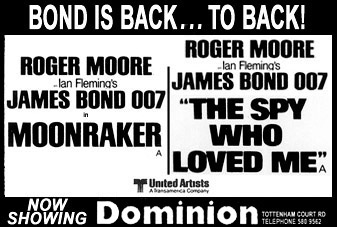 |
The ODEON Leicester Square is often called
‘the home of James Bond’, but it is the London Pavilion that had screened
all ten 007 films at some point during the last decade (Dr. No did
not screen at the ODEON until it 60th anniversary re-issue on Tuesday April 19,
2022; and Thunderball was only shown there for
the press on Tuesday December 28, 1965).
The London Pavilion
closed as a cinema on April 26, 1981, although its outside hoarding was used to
advertise For Your Eyes Only, which would open at the ODEON
Leicester Square in the summer. Before
the release of Roger Moore’s fifth outing as 007, a brief
re-issue of Moonraker/The Spy Who Loved Me opened at the
2,069-seat
Dominion, Tottenham Court Road playing for two weeks from Wednesday
April 1, 1981. |
|
|
“No one comes close to
James Bond 007”
For Your Eyes Only screened for the press on the
morning of Tuesday June 23, 1981, at the ODEON Leicester Square, and then had its Royal Charity Premiere
the following the evening in the presence of Prince Charles
with his fiancé Lady Diana Spencer and Princess Margaret. Also attending were stars Roger Moore, Topol, Lynn-Holly Johnson, Julian Glover,
Geoffrey Keen,
Walter Gotell, James Villiers and Main Title singer Sheena Easton. Director John Glen,
Executive Producer and Co-Screenwriter Michael G. Wilson, and Main Title
Designer Maurice Binder also attended the Premiere. Invited celebrity
guests included Michael & Shakira Caine, and film director Bryan Forbes accompanied
by his actress wife Nanette Newman. |
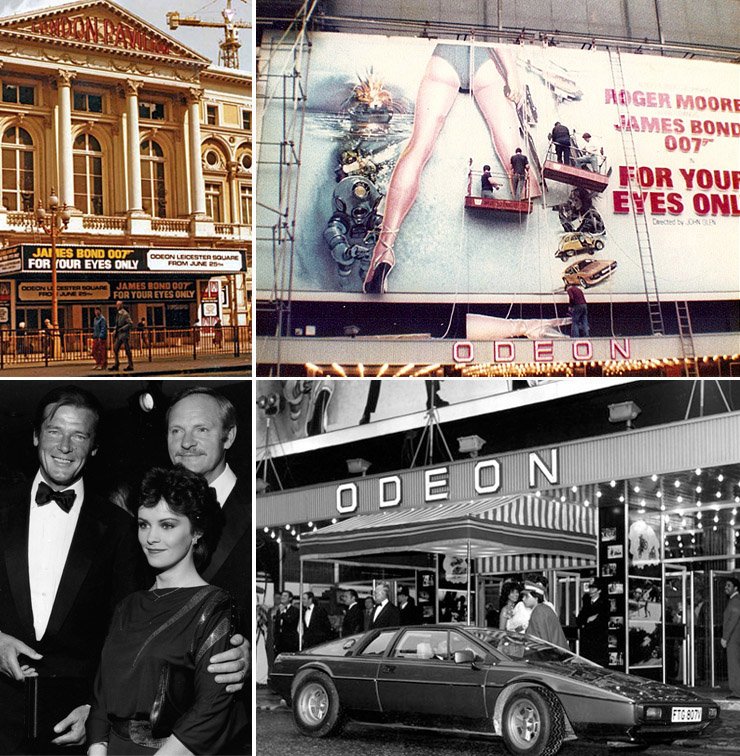 |
|
ABOVE: (top left)
The London Pavilion in 1981 advertises the release of For Your
Eyes Only at the ODEON Leicester Square (top right) The
morning of Wednesday June 24, 1981 - contractors work on the ODEON
Leicester Square display ahead of that evening's Premiere (bottom
left) Roger Moore and Julian Glover with For Your Eyes Only
Main Title singer/performer Sheena Easton (bottom right) A bronze Lotus Esprit featured
in the film outside the ODEON Leicester Square on Premiere night. |
|
|
|
Cassandra Harris also
attended the For Your Eyes Only Premiere with her
husband Pierce Brosnan. It was Israeli actor Topol who suggested to Producer Albert R.
Broccoli that he should also invite his former partner Harry Saltzman and
the pair
were reunited for the first time in several years. Harry Saltzman attended
with his children Hilary (1962-2019) and Christopher (1967-1991). The For Your Eyes Only
Premiere was one of Saltzman's first public appearances following the
death of his wife Jacqueline in 1980. Following the release of Dr. No
in 1962, producers Broccoli & Saltzman founded a company responsible
for the copyright and trademarks to the characters, elements, and other
material related to James Bond on screen. The company was called DANJAQ, a
combination of Broccoli & Saltzman's respective wives’ names Dana and
Jacqueline. Their sister company EON Productions was responsible for the
actual production of the films. In 1975 Harry Saltzman's personal
financial difficulties forced him to sell his 50% share of DANJAQ to
United Artists. |
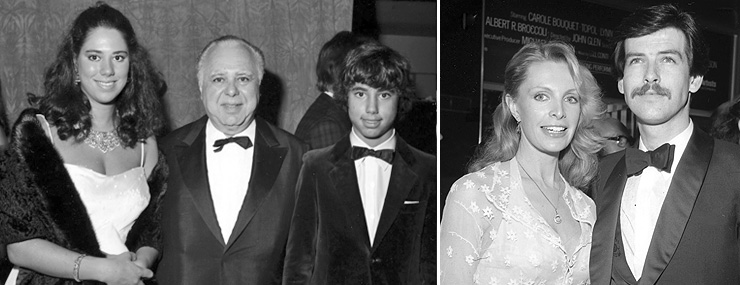 |
|
ABOVE: (left)
Harry Saltzman (with children Hilary and Christopher) attended the
For Your Eyes Only Premiere after an invitation from his
former partner Albert R. Broccoli. The pair were reunited for the
first time in many years. (right) Cassandra Harris
also attended accompanied by her husband Pierce Brosnan.
BELOW: (top centre) For You Eyes Only played for 11-weeks
at London's ODEON Leicester Square from Wednesday 24 June - Sunday
5 September 1981, and later (left) at ODEON Marble Arch from Thursday
August 27, 1981; and also at the Ritz Leicester Square from Thursday
November 12, 1981,
ending it's West End run with a four-week engagement at the Plaza
Lower Regent Street (bottom centre) from Saturday December 26, 1981 -
Wednesday January 20, 1982. |
|
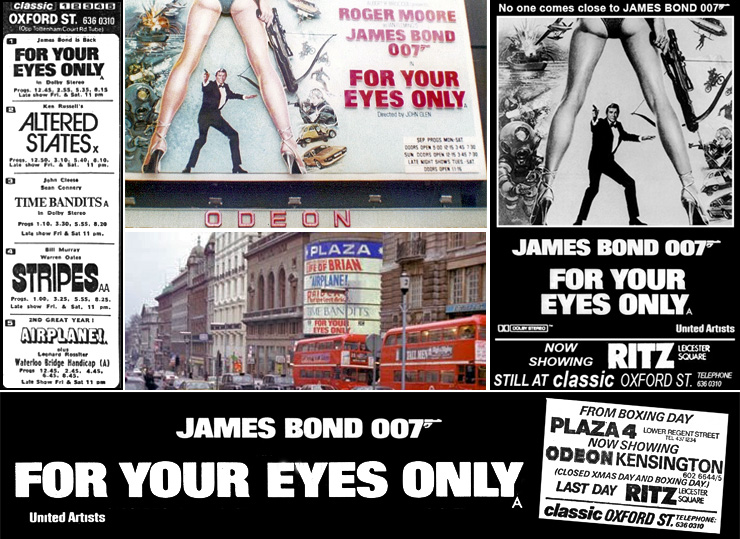 |
|
|
For Your Eyes Only
was seen by the public from Thursday June 25, 1981, and set an all-time
opening-day record for any film at any cinema in the UK with a gross of
£14,998, continuing to play at the ODEON Leicester Square for 11-weeks following its Royal
Premiere, and also a remarkable 20-weeks at the ODEON Kensington; spending
the six weeks in Screen 1 from Thursday July 23, 1981, followed by
14-weeks on the smaller Screen 2 from Thursday September 3rd. After
a one-week break For Your Eyes Only then returned to the
665-seat ODEON 1 Kensington for another seven days from Thursday December
17, 1981. For Your Eyes Only also screened at the ODEON Marble Arch for 11-weeks from Thursday
August 27, 1981. Roger Moore's fifth James Bond film then had a 16-week
run at the Classic cinema in Oxford Street from Thursday September 3, 1981,
and a 6-week engagement at the Ritz in Leicester Square from Thursday
November 12th. For Your Eyes Only finished its West End run with a
4-week engagement at the Plaza Lower Regent Street, playing in the 181-seat
Screen 4 from Saturday December 26, 1981. |
|
|
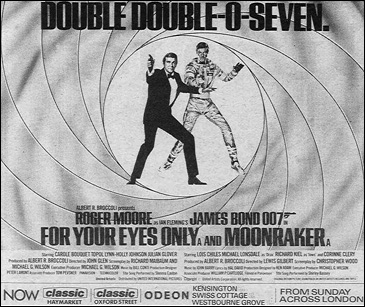 |
For Your Eyes Only was
then re-issued on a double-bill with Moonraker at the Classic,
Haymarket and Oxford Street cinemas for five weeks commencing Thursday
July 1, 1982; and ODEON 1 Kensington for one week. The UK video rights to the James Bond films were acquired by
Warner Home Video and their first releases in June 1982 were From
Russia With Love and Goldfinger. The VHS and Betamax
releases of all titles up to and including For Your Eyes Only
were leased by video stores and available to rent by June 1984. It
would be another five years before all the films up to and including
A View To A Kill were available to own as sell-through titles.
By December 1982 all Bond films up to and including Moonraker
had also now been shown on UK television.
1983 marked the 21st
anniversary of James Bond in the cinema and Octopussy was
advertised on the outside hoarding of the London Pavilion prior to its
June 6th premiere at the ODEON Leicester Square. |
|
|
On Friday May 27, 1983, a
special anniversary documentary was broadcast on the ITV television
network in the UK and made the
cover of the popular weekly television listings magazine TVTIMES. James Bond: The First 21 Years, was made by
London Weekend Television and featured clips from the first 12 James
Bond films, but was ostensibly designed to promote the upcoming release of
Octopussy. The one-hour programme featured many former Bond film
actors and celebrities, including Paul McCartney, and US president Ronald
Reagan singing the praises of fictional super spy 007 as if he was a real
person! |
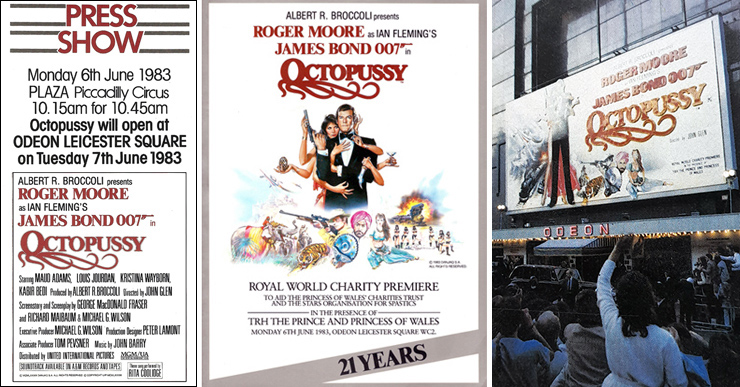 |
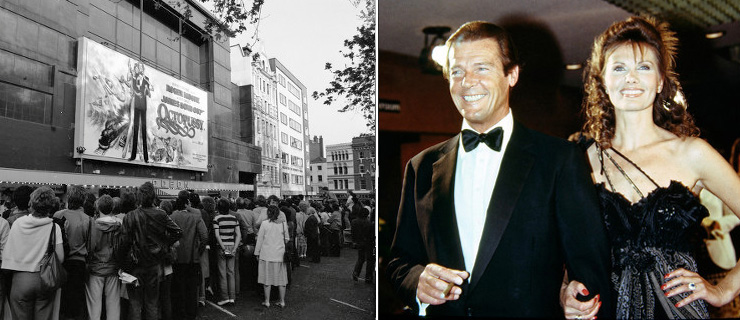 |
|
“James Bond's All Time
High”
The 13th film in the official series was screened for the press on the
morning of Monday June 6, 1983, at the Plaza cinema, Piccadilly
Circus. Octopussy then had its Royal World Charity Premiere at the ODEON Leicester Square
later that evening. The Premiere was attended by Prince
Charles and Princess Diana, stars Roger Moore, Maud Adams, Louis Jourdan [pictured below
right with his wife Berte], Kirstina Wayborn, Kabir Bedi, Vijay
Amritraj, Walter Gotell, Lois Maxwell, Desmond Llewelyn, Producer Albert R.
Broccoli, Director John Glen, and Executive Producer/Co-Screenwriter
Michael G. Wilson. Octopussy Main Title Designer Maurice Binder,
‘All Time High’ singer Rita
Coolidge and Lyricist Tim Rice. Also attending was Chaim Topol who had
played Milos Columbo in For Your Eyes Only (1981). This Israeli
actor was currently in London taking part in rehearsals for the revival of
the stage musical Fiddler On The Roof at the Apollo Victoria
Theatre, where he reprised his starring role as Tevye. Among the invited celebrity guests were
The Man With The Golden Gun title singer Lulu, For Your Eyes Only villain Julian Glover, along with
Wimbledon tennis champion John McEnroe, popular entertainer Cilla Black, and broadcasters David Frost and Terry Wogan. ‘Goldfinger’ and ‘You Only
Live Twice’ lyricist Leslie Bricusse was also invited to the Octopussy
Premiere, and with Hollywood stars Tom Selleck and
Liza Minnelli, also attended the after-show party at the
Kensington Roof Gardens, celebrating
21 years of James Bond in the cinema. Although he had briefly returned to
London to score Octopussy, composer John Barry did not attend the
premiere because at this time he was a UK tax exile, and living in New York.
Returning to the series after a one-film absence, John Barry remained
loyal to the EON series and had turned down the offer to score Never
Say Never Again (1983). |
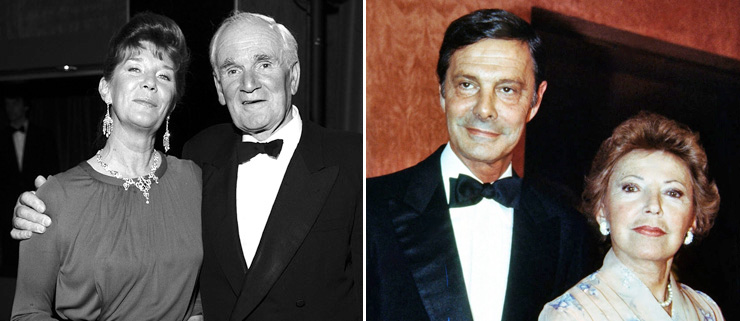 |
|
After nine days at the
ODEON Leicester Square the film had broken the house record taking
£113,704. After the first five weeks playing exclusively at the ODEON
Leicester Square Octopussy had taken £426,773, which was then an
all-time record for any film that played there. Octopussy
transferred to the Empire 2, Leicester Square from Wednesday August 17, 1983, and
then opened at the ODEON Marble Arch the following day where it
played in a 70mm version on the largest cinema screen in the country. Both
cinemas retained Octopussy until Thursday December 8, 1983.
Octopussy also opened at the ODEON Kensington on Thursday August 18,
1983; playing for three-weeks on Screen 1, and then transferring to Screen
2 for two-weeks from Thursday September 8th, followed by another
five-weeks on the smaller Screen 4 from Thursday September 22nd. |
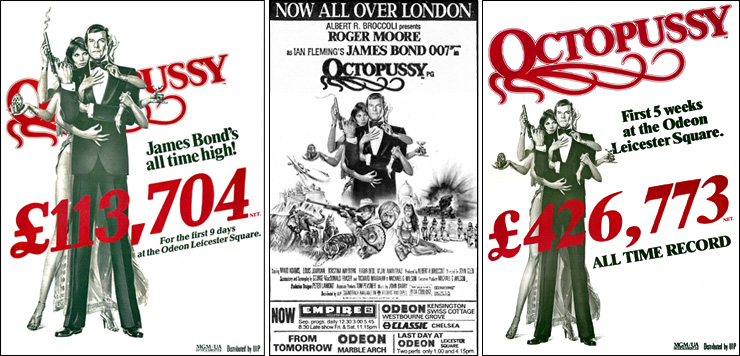 |
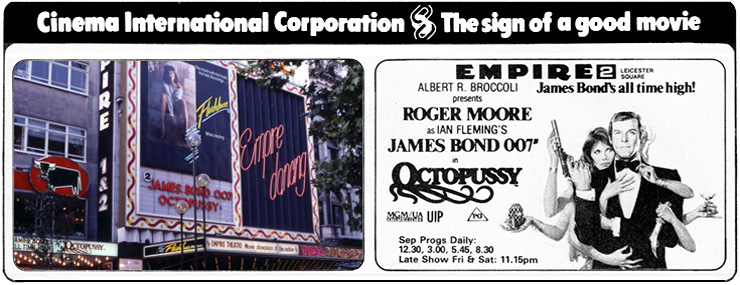 |
|
“Double
Double-O-Seven”
Although hyped in the
press as ‘The Battle of the Bonds’, Sean Connery’s comeback as 007 in
Never Say Never Again didn’t really amount to a battle at the
cinema as the films were never really in direct competition in the UK.
Octopussy screened across the country from June to December 1983;
whilst Never Say Never Again didn’t open in London until
Wednesday December 14, 1983 (it had opened in the USA on October 7, 1983). However, the
presence of a rival James Bond film clearly concerned EON Productions and United International Pictures, then distributors of the Bond films in the UK. |
|
|
|
A week before the
opening of Never Say Never Again a triple-bill of Octopussy, For
Your Eyes Only and Thunderball opened at the 1,330-seat Empire 1 cinema,
Leicester Square, which then had a huge screen (60 feet wide by 25 feet
high). The print of Thunderball was struck from the
original negative in 1979 and was a
clear signal to the makers of the rival film that although Roger Moore was
the ‘official’ James Bond, it was Sean Connery in the same series that
made the Never Say Never Again story first! Only one print of
Thunderball was in circulation at that time, so at the ODEON Marble
Arch Diamonds Are Forever was substituted in its
place. A unique quad-crown poster was created for this exclusive Empire
Leicester Square engagement utilising the Roger Moore For Your Eyes
Only poster pose, but with a redrawn generic face. These quads would
only be displayed at the Empire and in the London underground, so are
among the rarest of all James Bond posters. |
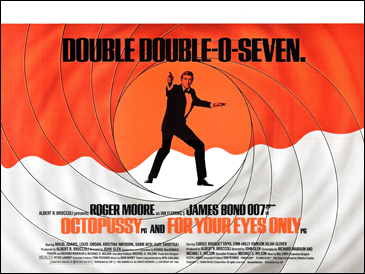 |
An equally rare
hand-lettered text only quad-crown poster was created for the Marble
Arch screening. The three films screened for two weeks from Friday
December 9, 1983 at the Empire 1; with the trio playing for extra day
at the ODEON Marble Arch on Friday December 23, 1983, followed by a
single performance of
Octopussy only at 1.45pm on Christmas Eve. Following its
two-week run in London, the print of Thunderball was returned to the Rank Film
Depot in Birmingham, and sometime in 1984 was thrown out with many old and
damaged prints when the depot ceased operation. A double-bill of
Octopussy/For Your Eyes Only then opened at the
Cinecenta 4, Panton Street for two weeks commencing Friday December 23,
1983; and concurrently at the
Classic 1, Oxford Street for three weeks. This final double-bill would be revived again
at the Plaza 2, Piccadilly Circus in August 1984.
|
|
|
“Films now
change on
Thursdays Fridays...”
Since the earliest days of cinema, films outside London's
West End usually opened on Sundays. From January 27, 1983, the
opening day for new films on general release in the UK was
changed to Thursday. This had also been the changeover day
traditionally adopted by cinemas in coastal resorts (giving
holidaymakers two different programmes in one week), and still the
day many weekly paid workers received their wages. This change
coincided with an overhaul of the ratings system by the
British Board of Film Censors [British Board of Film
Classification from 1984], and the introduction of new
certificates which made it easier to understand how a film was
classified. |
 |
|
The ‘U’
certificate remained the same meaning the film was passed for
all audiences. The ‘A’ rating was changed to ‘PG’ (Parental
Guidance - general viewing but some scenes may be unsuitable
for young children), ‘AA’ was changed to ‘15’ (no person under
the age of 15 to be admitted), and ‘X’ became ‘18’ (no person
under the age of 18 to be admitted). The new ratings came into
effect from November 1, 1982. This was the first major change
to BBFC ratings since the introduction of the ‘AA’
certificate on July 1, 1970 (restricting admission to those
over 14), and the raising of the age for admittance to ‘X’
rated films from 16 to 18.
|
|
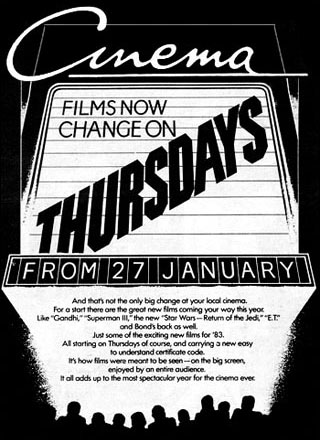 |
|
In an attempt to combat the continuing decline in cinema attendance, film
distributors took the decision to make a change for the second time within
a year. The Society of Film Distributors agreed that the
short-lived change to Thursdays was ill-conceived, and after
consultation with
the Cinematograph Exhibitors’ Association, the programme changeover day then became Friday from November 11,
1983, and remains so to this day. A spokesman for the ABC Group
said: “There's no question that many look forward to starting a
weekend of leisure on a Friday evening and the cinemas believe
that their Friday patrons are among the keenest and want to see
the latest releases the day they open.” In recent years a great
deal of importance has been attached to the box-office takings
over the opening weekend for new titles, and the measure of a film's success
is
often decided in the first three days of release. |
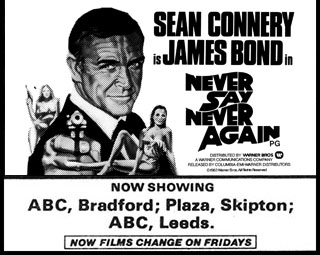 |
|
|
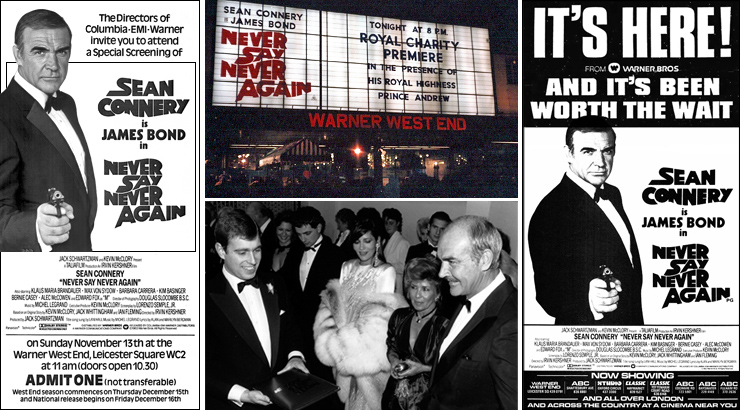 |
|
Never Say Never Again was first shown in London on the morning of
Sunday November 13, 1983, at the Warner Theatre, Leicester Square.
The special screening, at the invitation of distributors
Columbia-EMI-Warner, was essentially for crew members to see the film prior to
its
UK release. The print screened included the uncut version of the scene
where Bond, with Domino, ride a horse over the parapet of the fortress
where 007 has been kept prisoner by Largo. The Royal Society for the Prevention
of Cruelty to Animals took exception to the
scene on the grounds of alleged animal cruelty, as the horse is clearly
seen hitting the water from a great height. The RSPCA persuaded the
British Board of Film Censors to cut the film before its release in
the UK. Under the provision of the Cinematograph Films (Animals) Act 1937,
an 8-second cut was made remove a shot which contains cruel treatment of a
horse. All
subsequent UK prints of the film (including home media releases and TV
screenings) feature a re-edited version of this scene removing
the horse hitting the water and using an alternate angle of the animal
swimming away safely. Also, in the scene where Fatima Blush (Barbara Carrera) knocks Bond off the Q motorbike and instructs him to throw his
Walther P5 to the ground, the sound effect on the preview print made the
gun sound like it was a child’s hollow plastic toy hitting the ground; in
all subsequent prints the sound effect was changed to make it sound like a
heavy metal firearm had been tossed on to the concrete floor. |
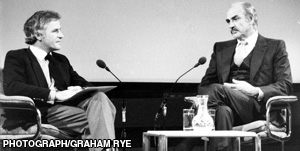 |
Sean Connery was then
honoured with a Guardian Lecture at the National Film Theatre on
London's South Bank on the evening of December 13, 1983, where he
was interviewed on stage by film critic Iain Johnstone (1943-2023). The NFT
had devoted
the first two weeks of December to a retrospective of Connery's most
important films, starting with a double-bill of Dr. No/From
Russia With Love.
|
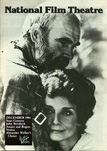 |
|
|
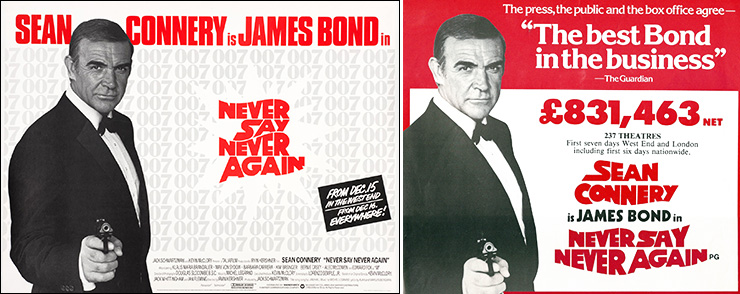 |
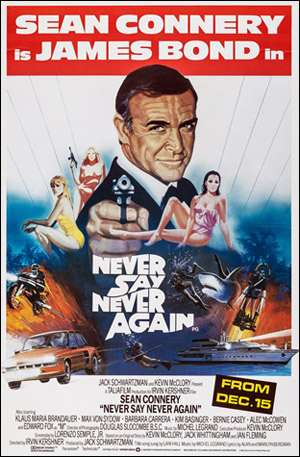 |
Never Say Never Again
had its UK Royal Charity Premiere at the Warner Theatre,
Leicester Square on the
evening of Wednesday December 14, 1983, in the presence of Prince Andrew
(now Andrew Mountbatten Windsor).
The cinema was closed to the public for the
whole day. Sean Connery attended along with his second wife Micheline and brother
Neil and his family. Director Irvin Kershner also attended with
Executive Producer Kevin McClory, and actors Barbara Carrera, Pamela Salem and Rowan Atkinson. Never Say Never Again then played at
seven other selected cinemas in London's West End from Thursday December 15th, and
then all over London and the rest of the UK from Friday December 16,
1983.
Never Say Never Again
played in Screen 2 at the Warner West End (the largest of the five screen complex) for six weeks
from Thursday December 15, 1983, and although ultimately not as successful as Octopussy, distributor Warner Brothers were quick to announce the initial box-office
take after the first week of release in 237 theatres. Never Say Never
Again then moved to screen 4 for another six weeks
from Friday January 27, 1984; transferring to
screen 5 for a further 28 weeks from Friday March 9, 1984. Never Say
Never Again finished its West End run at the Warner Theatre on
Thursday September 20, 1984, where it had played for a staggering 9
months. Outside
London,
Never Say Never Again did not have the staying power of
earlier James Bond films, and had more or less finished its provincial theatrical
engagements shortly before its Warner Home Video rental
release in July 1984. |
|
|
As part of its West End run Never Say
Never Again screened for eight weeks at the Studio 4, Oxford
Circus from Friday December 16, 1983; also playing at the 616-seat ABC
1, Shaftesbury Avenue and 328-seat Classic 1, Tottenham Court Road for
six weeks. Never Say Never Again also played for six weeks at
the 491-seat Classic 1, Haymarket until Friday January 27, 1984, when
it transferred to the smaller 222-seat screen 3 for a further three
weeks. |
|
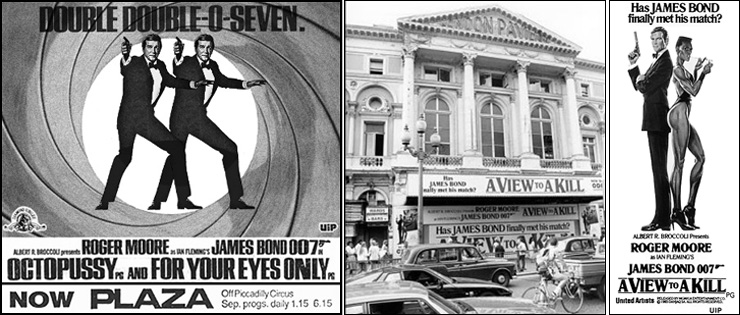 |
|
ABOVE: (left) The
final UK double-bill was a second release of Octopussy/For
Your Eyes Only in August 1984. (centre) Although the London
Pavilion had closed as a cinema in April 1981 and the building
remained unused for the next five years, its exterior hoarding was
still used to advertise upcoming United Artists releases. The West
End engagement of the 14th James Bond film A View To A Kill,
which had its Royal Charity Premiere at the ODEON Leicester Square
on June 12, 1985 (following the World Premiere in San Francisco
three weeks earlier) was also promoted at the London Pavilion on
Piccadilly Circus. |
|
|
|
“James Bond will
return”
From the heights of ‘Bondmania’ two decades earlier when around 12,000 prints of Thunderball were in circulation across the world, the
last remaining one suitable for cinema exhibition was junked in 1984.
There was one last release of Octopussy and For Your
Eyes Only which a had three-week run in London at the 378-seat
Plaza 2, Piccadilly Circus from Friday August 24, 1984. The
double-bill had already briefly played at the Classic 1, Oxford Street
and Cinecenta,
Panton Street in the last week of December 1983. This final pairing
had a very limited release in provincial cinemas in early 1984, and did
not prove as successful as earlier revivals as both films were already
available to rent on video.
From the spectacular
post-war high of 1.64-billion admissions in 1946, UK cinema attendance
gradually declined to an all-time low of just 54-million in 1984. With
most films already available to rent on video (and bootleg copies of
the films easily obtainable if you knew the right/wrong people), the golden
age of cinema-going was coming to an end. Although each subsequent
James Bond film has had a Royal Charity Premiere in London and initial
release across the country, it is the home cinema market which now
accounts for much of the series’ continued success.
From the early 1980s,
video became more popular and affordable and TV screenings of the
films increased in their frequency. Hardcore Bond fans could own
flawless (by the standards of the day) copies on laserdisc – with
making-of documentaries and rare behind-the-scenes material. The
advent of DVD and subsequently Blu-ray and more recently 4K UHD, means that fans
can now enjoy
their favourites in a quality that far exceeded how the films looked on
their original release in cinemas. Free from scratches, tears, missing
frames and the well-remembered end of the reel snowstorm… but that was
part of the fun, wasn’t it?

|
|
...in part two of this
exclusive article |
 |
|
...and also in a new and exclusive article looking at
the
studio
that brought
James Bond to the big screen... |
 |
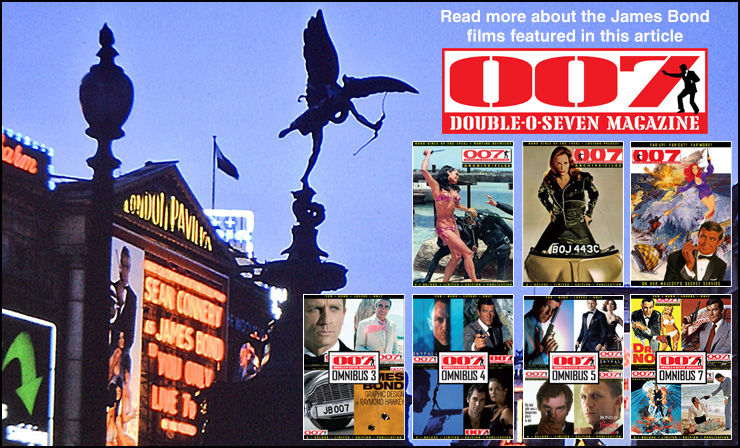 |
|
 |
©007 MAGAZINE 2025
Part one first published February 27, 2016
Updated version first published June 23, 2021
|
|












